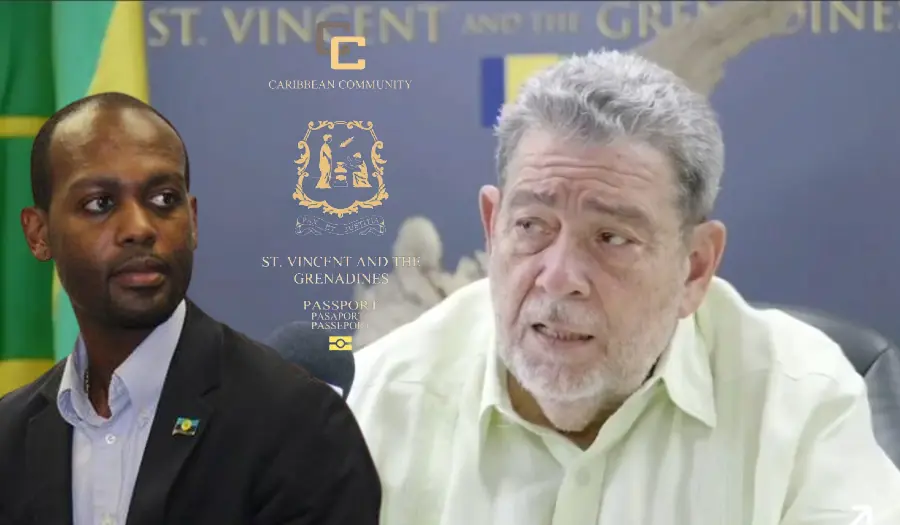PM Gonsalves Rubbishes NDP Candidate’s Claim on CBI
St Vincent’s Prime Minister Ralph Gonsalves has dismissed a claim made by NDP candidate Kishore Shallow, who alleged that a regional leader told him Gonsalves has his own form of CBI.
Gonsalves told the St. Vincent Times on Monday that what Shallow said is “rubbish; they are muddying the water and doubling down because their Chinese financiers operating from a unit in an embassy on a Caribbean island are demanding it, but they know the program is coming to an end.”
Gonsalves informed the publication that there exists no legal framework in St Vincent for the sale of passports, and that his administration does not engage in any Citizenship by Investment schemes. He stated that upon assuming office, he annulled the ACT enacted by the James Mitchell administration, which would have facilitated such a programme.
“While I was in the Opposition, I said in the parliament then I was opposed to such a programme. The NDP sold 10 or so citizenships. They called it ‘Honorary Citizenship’. I remember one Chinese national had paid money. When we won in 2001, I revoked that law immediately, and officials told me I would have to pay back the Chinese national. I said no such thing would happen; of course, the Chinese who had called for his money never pursued the matter after I spoke.”
“It’s the same law the NDP wants to bring back,” Gonsalves said.
Regarding individuals acquiring citizenship in SVG, the prime minister informed St Vincent Times that the predominant demographic consists of Caribbean nationals.
“I can’t say the exact number per year; however, the majority are Caribbean nationals through marriage. There are a few Middle Eastern individuals, like the Syrians who have been here for a substantial amount of years and a few Nigerians who live here and are married to Vincentians.”
“When I interview someone for citizenship, all the paperwork is already in order; the interview is just a formal thing. 99.9 per cent of the persons we interview have already been determined. However, there may be a few questions you may still want to ask.”
According to Section 9 of the St Vincent and the Grenadines Citizenship Act, Chapter 117, citizenship can be acquired through registration, including by marriage to a Vincentian, or after seven years of temporary residence or permanent residency. Citizenship can also be obtained by descent if one or both parents were born in St Vincent and the Grenadines. The 2023 Citizenship Act also allows for citizenship for second-generation Vincentians, including grandchildren born abroad to someone born in St Vincent and the Grenadines.
By Naturalisation:
A significant requirement is that the applicant has made a substantial contribution to the cultural or economic growth and development of the country for a period of at least five years. This could include contributing to the arts, business, or other sectors that benefit the nation.
The NDP has unequivocally stated their intention to implement a CBI programme governed by stringent guidelines once elected to office in the forthcoming election.
In March, the Committee on Civil Liberties, Justice and Home Affairs (LIBE) of the EU Parliament cast a vote that could lead to the revocation of visa-free access for nations that provide citizenship by investment (CBI) programmes. The vote transcends mere bureaucratic procedure; it represents a direct challenge to the concept of citizenship through investment.
The regions of focus were predominantly Caribbean nations, including Antigua & Barbuda, Dominica, Grenada, Saint Kitts & Nevis, and Saint Lucia. In 2024, the nations responded by formalising a Memorandum of Agreement that delineated shared standards, imposed a suspension on Russian applicants, and established uniform minimum investment thresholds.
On May 1, in a significant ruling, the Court of Justice of the European Union (CJEU) determined that Malta is prohibited from continuing its “golden passports” program, which has facilitated the acquisition of Maltese citizenship—and consequently EU citizenship—by foreign nationals.
The ruling affirms that member states are prohibited from commercialising EU citizenship or engaging in irresponsible golden passport schemes. A multitude of instances has demonstrated how these schemes have provided refuge to corrupt individuals from various corners of the globe, as well as other dubious figures within the EU. The ruling not only halts Malta’s ability to sell EU citizenship but also serves to inhibit other member states from engaging in similar practices.
The official website for Saint Kitts & Nevis citizenship outlines that a significant advantage of acquiring a passport via the Citizenship by Investment program is the provision for visa-free travel within the Schengen Area, permitting stays of up to 90 days within a 180-day timeframe. The recent ruling by the EU court indicates a reduction in the scope of travel options available to the buyer.



